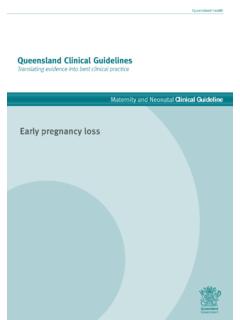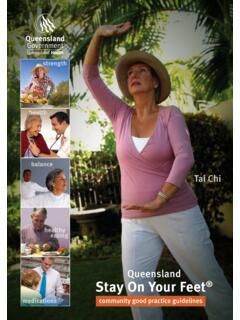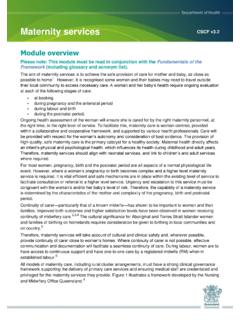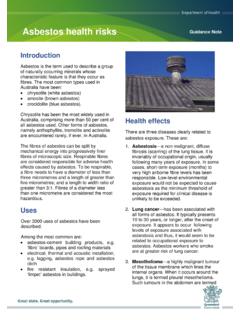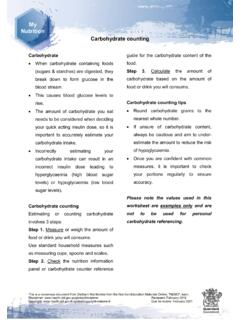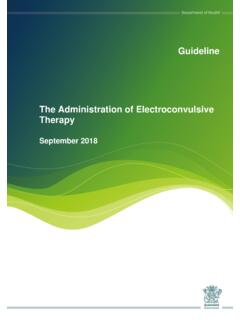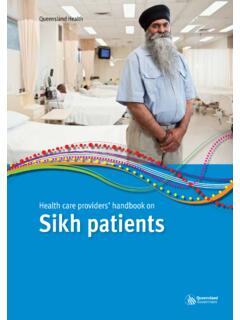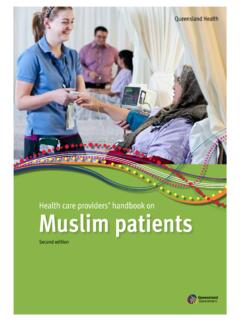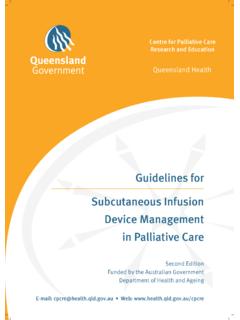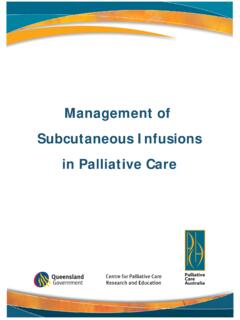Transcription of Sexual health and safety guidelines for mental health ...
1 Sexual health and safety guidelines mental health , alcohol and other drug services 2016. Document Number #QH-GDL-434:2016. Sexual health and safety guidelines mental health , alcohol and drug services QH-GDL-434:2016. Published by the State of Queensland (Queensland health ), September 2016. This document is licensed under a Creative Commons Attribution Australia licence. To view a copy of this licence, visit State of Queensland (Queensland health ) 2016. You are free to copy, communicate and adapt the work, as long as you attribute the State of Queensland (Queensland health ). An electronic version of this document is available at Disclaimer: The content presented in this publication is distributed by the Queensland Government as an information source only. The State of Queensland makes no statements, representations or warranties about the accuracy, completeness or reliability of any information contained in this publication. The State of Queensland disclaims all responsibility and all liability (including without limitation for liability in negligence) for all expenses, losses, damages and costs you might incur as a result of the information being inaccurate or incomplete in any way, and for any reason reliance was placed on such information.
2 Sexual health and safety guidelines mental health , alcohol and other drug services - ii - Contents 1. Purpose .. 1. 2. 1. 3. Related documents .. 1. 4. Principles .. 2. 5. Background and development of the guidelines .. 2. 6. Sexual health .. 3. 7. Sexual safety .. 4. What is Sexual safety ? .. 4. mental health alcohol and drug service 4. A service culture which promotes Sexual safety .. 4. Information for clients, family members and significant others .. 5. Information, education and training for staff .. 6. 8. What are Sexual safety incidents? .. 7. Sexual assault .. 7. Sexual harassment .. 8. Consensual Sexual activity in an inappropriate context or setting .. 8. Sexual acts as a result of a client's Sexual disinhibition .. 9. 9. Preventing Sexual safety incidents .. 9. Risk assessment .. 9. Risk mitigation .. 12. Service environment and 13. 10. Responding to disclosures of Sexual assault .. 13. Responding to disclosure of recent Sexual assault.
3 14. Responding to disclosure of past Sexual assault .. 16. Considerations for clients under 18 .. 16. other services which can provide assistance .. 17. 11. Responding to Sexual activity .. 17. Considerations for clients under 18 .. 18. Considerations for clients in extended treatment or community care units .. 18. 12. Vulnerable groups .. 19. 13. Sexual relationships between staff and 21. Sexual health and safety guidelines mental health , alcohol and other drug services - iii - 14. Privacy, confidentiality, documentation and record keeping .. 22. 15. Service evaluation/monitoring of practice .. 23. 16. 24. Sexual health and safety guidelines mental health , alcohol and other drug services - iv - 1. Purpose The Sexual health and safety guidelines mental health , alcohol and other drug services 2016 (the guidelines ) provides information for mental health and alcohol and drug treatment services (Services) to: highlight Sexual health as an important part of providing holistic care for clients improve recognition of factors impacting on the Sexual safety of clients identify and appropriately respond to Sexual safety risks appropriately respond to allegations of Sexual assault establish a service culture which promotes Sexual health and Sexual safety facilitate development of local processes and procedures related to Sexual health and Sexual safety , which meet the needs of clients accessing the Service.
4 2. Scope The guidelines are intended for use in all Queensland public mental health and alcohol and drug treatment services, across all settings and age groups. The information presented in the guidelines is intended to embed Sexual health considerations as a part of everyday care. It outlines potential Sexual safety issues, thereby providing an evidence base and succinct information with which to guide the service response including service planning, employee education and training and development of tailored local response procedures. 3. Related documents Queensland Legislation Criminal Code Act 1899. Anti-Discrimination Act 1991. Child Protection Act 1999. Public health Act 2005. mental health Act 2000. Hospital and health Boards Act 2011. Information Privacy Act 2009. health Practitioner Regulation National Law (Queensland). Supporting documents/ guidelines /standards National Standards for mental health Services (2010). National safety and Quality health Service Standards (2012).
5 Response to Sexual assault - Queensland Government Interagency guidelines for Responding to People who have Experienced Sexual Assault (2014). Queensland health Guide to Informed Decision-Making in Healthcare (2011). Queensland health Service Directive Guideline for Clinical Incident Management (2013). Sexual health and safety guidelines mental health , alcohol and other drug services -1- Guideline for Reporting a Reasonable/Reportable Suspicion of Child Abuse and Neglect (2015). Guideline for Conducting Child Sexual Assault Examinations (2015). Queensland Sexual health Strategy 2016-2021 (consultation draft). Aboriginal and Torres Strait Islander adolescent Sexual health guideline (2013). Queensland Public Service Code of Conduct (2011). National Code of Conduct for Healthcare Professionals (Queensland, 2015). 4. Principles Promoting Sexual health and Sexual safety , and responding to Sexual assault and harassment in Services should be undertaken within a framework consistent with the following overarching principles: 1.
6 The safety , and physical and psychological needs of clients are of paramount consideration. 2. The right of all clients to be treated with respect and dignity. 3. Clients have the right to receive services free from abuse, exploitation, discrimination, coercion, harassment and neglect. 4. Information is provided to clients in a manner that addresses issues of equity and access to ensure the individual needs of the client are met in regards to language, culture, age, disability, gender, sexuality and capacity. 5. Clients have a right to participate in decisions about their treatment and care. Informed decision making will be promoted, facilitated and respected at all times. 6. Clients' sense of personal control will be supported and encouraged. 7. mental health and alcohol and drug treatment services utilise trauma informed care and practice when responding to reports of Sexual safety incidents and promoting Sexual health and safety . 8. Hospital and health Services have a responsibility to ensure staff working in these services are provided with comprehensive education and training to enable them to effectively promote Sexual health and Sexual safety and respond appropriately to reports of Sexual safety incidents.
7 9. All Sexual safety incidents and allegations of Sexual assault are reviewed, comprehensively documented and accurate records are kept. Documentation and records are prepared in accordance with legal and Queensland health requirements, including obligations relating to privacy and confidentiality. 5. Background and development of the guidelines The guidelines supersede the Responding to Sexual assault and promoting Sexual safety within Queensland health inpatient mental health services' guidelines , which were implemented in 2004. (2004 guidelines ). The 2004 guidelines were developed following an expressed need from staff and consumers in Sexual assault and disability sectors to prevent and address occurrence of Sexual assault in inpatient mental health services. Sexual health and safety guidelines mental health , alcohol and other drug services -2- Feedback provided to the Office of the Chief Psychiatrist, mental health Alcohol and other Drugs Branch has identified a need to expand the scope of the 2004 guidelines to cover alcohol and drug treatment services, all age groups, and both inpatient and community settings.
8 For the purposes of the guidelines , the term client' is used to describe an individual who is receiving treatment from a mental health and/or alcohol and drug treatment service. The Office of the Chief Psychiatrist convened an Expert Reference Group to lead the review of the 2004 guidelines , with the following sectors represented: adult mental health community, acute inpatient and extended inpatient high secure inpatient child and youth community and acute inpatient older persons community and acute inpatient alcohol and other drugs treatment community and inpatient Queensland health Patient safety and Quality Improvement Service Hospital and health Service Child Protection Service Strategic Policy Unit, Department of health Hospital and health Service Sexual health and Sexual Assault Services. Further consultation was undertaken with the following stakeholder groups: Queensland health mental health and alcohol and drug service clinicians Queensland Police Service Queensland health Legal Branch mental health Alcohol and other Drugs Branch.
9 6. Sexual health The World health Organization defines Sexual health as a state of physical, emotional, mental and social well-being in relation to sexuality; it is not merely the absence of disease, dysfunction or infirmity. Sexual health requires a positive and respectful approach to sexuality and Sexual relationships, as well as the possibility of having pleasurable and safe Sexual experiences, free of coercion, discrimination and violence. For Sexual health to be attained and maintained, the Sexual rights of all persons must be respected, protected and fulfilled.' (World health Organization, 2016). The Sexual health needs of people accessing Services are often overlooked due to the focus on illness symptoms, substance use issues or functional impairment. Sexuality is a fundamental aspect of health and well-being for all individuals, but is often a difficult and sensitive subject to discuss, even in the most trusting relationships (S Esmail, 2010).
10 A holistic recovery-oriented approach to care in mental health alcohol and other drugs services addressing psychological, physical health , vocational and community connectedness often overlooks the Sexual health needs of these clients. However, Sexual health is an important consideration for our clients because they can be more vulnerable to poorer Sexual health outcomes due to their illness, effects of medication and alcohol and drug use. Hepatitis C is commonly associated with IV drug use, and alcohol and drug use is a risk factor for unsafe Sexual practices which can lead to sexually transmitted infections and blood borne viruses. Sexual health and safety guidelines mental health , alcohol and other drug services -3- Conducting Sexual health checks is an essential part of providing holistic care for clients. Staff should ensure the client's Sexual health needs are met and link their clients to services which conduct relevant Sexual health checks, including GPs.
